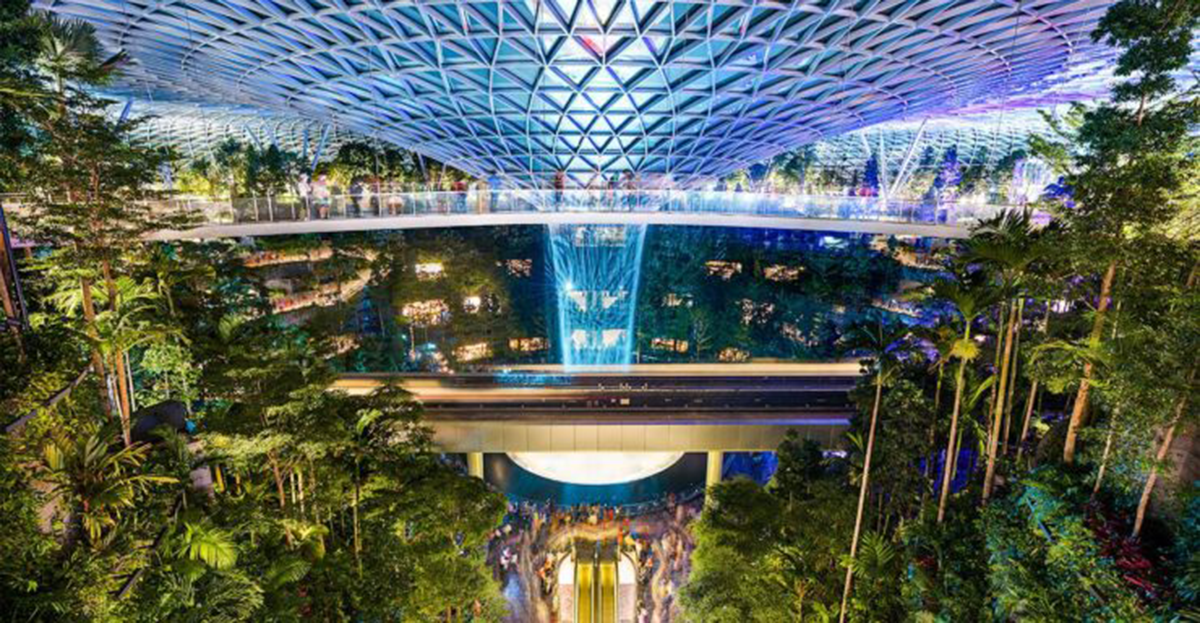Singapore remains a popular destination for Filipinos. For so many of us, the so-called “Lion City” offers a glimpse into what our country can become.
This city state has evolved from a precolonial empire hub to a colonial trading post and, ultimately, into a thriving global trade mecca. Amid this industrial transformation, Singapore has upheld its commitment to cultural diversity and environmental stewardship—qualities reflected and encapsulated in its monikers, the “Gateway to Asia” and the “Garden City.”
Landmarks across Singapore embody its progress, multicultural vibrancy, and sustainability, offering visitors a rich and rewarding glimpse into this great city.
Jewel Changi Airport
In the Philippines, we go to the airport early to avoid traffic jams and allot time for immigration processes.
In Singapore, some like to head to the airport early because they want to enjoy experiences that set the country apart, from automation to connectivity to, yes, shopping at Jewel Changi Airport. It’s a glass-and-steel dome ingeniously integrating fun and nature. Don’t leave for the airport terminals until you’ve hung out by the Shiseido Forest Valley and seen the spectacular cascade.
Gardens By The Bay
Green thumbs will love Gardens By The Bay, a garden complex that opened in 2012 as part of the government’s “City in a Garden” vision and a complement to the Singapore Botanic Gardens, a Unesco World Heritage Site.
Its arresting architecture and vast collection of plants from five continents quickly made it an icon. The place is within walking distance from other Marina Bay attractions: Merlion Park, the durian-inspired Esplanade Theatres on the Bay, the Singapore Flyer and the Marina Bay Sands.
Lau Pa Sat
Lau Pa Sat is a top foodie destination for at least two reasons: It is a stellar example of adaptive reuse for heritage buildings and an access point to the renowned hawker culture.
On the site of one of Singapore’s oldest wet markets, visitors can immerse in a Unesco-listed intangible cultural heritage that puts Chinese, Malay, Indian and international fare on the table. Queue where the long lines are for they reveal which stalls locals find good. It’s best to get there before 7 p.m. so you can catch Boon Tat Street turning into Satay Street.
National Gallery Singapore
Yet another proof that Singapore cares for its old buildings is the National Gallery in the Civic District, the heart of colonial Singapore.
Converted from the Former City Hall and Supreme Court, it is now home to over 9,000 works and, thus, owns the largest public collection of modern art in Southeast Asia. Its collection focuses on Singaporean and Southeast Asian art produced since the 19th century. The gallery offers free hour-long tours. It also houses bars, restaurants and lounges.
Little India
Singapore has three major precincts that provide a glimpse of the country’s multicultural nature.
You may visit Kampong Gelam or Chinatown to immerse in Malay and Chinese heritage. Little India, however, can transport you to South Asia, a region you might not have reached yet. Once a residential area for Europeans, the place turned into a charismatic trade and community hub for Indian migrants.
Visit the temples and spot the murals. Taste Indian fare at each turn or—as a Filipino—try haggling for saree and other pasalubong.
